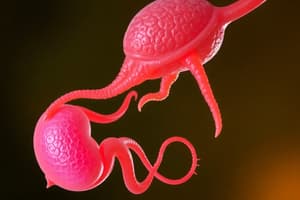Podcast
Questions and Answers
What is the primary function of meiosis in gametogenesis?
What is the primary function of meiosis in gametogenesis?
- To increase the number of chromosomes in gametes
- To reduce the number of chromosomes in gametes by half (correct)
- To enhance the rate of fertilization
- To promote genetic variation in a population
What is the term for the process of formation of egg cells in the ovaries of females?
What is the term for the process of formation of egg cells in the ovaries of females?
- Oogenesis (correct)
- Spermatogenesis
- Fertilization
- Gametogenesis
What is the term for the immature cells that give rise to sperm cells in males?
What is the term for the immature cells that give rise to sperm cells in males?
- Spermatocytes
- Spermatids
- Spermatogonia (correct)
- Spermatozoa
What is the result of the fusion of a sperm and an egg cell?
What is the result of the fusion of a sperm and an egg cell?
What is the importance of gametogenesis in sexually reproducing organisms?
What is the importance of gametogenesis in sexually reproducing organisms?
What is the term for the process of maturation of gametes, involving changes in cell structure and function?
What is the term for the process of maturation of gametes, involving changes in cell structure and function?
Study Notes
Overview
Gametogenesis is the process of formation of gametes (sperm and egg cells) in the reproductive organs of an organism.
Types of Gametogenesis
- Spermatogenesis: The process of formation of sperm cells in the testes of males.
- Oogenesis: The process of formation of egg cells in the ovaries of females.
Stages of Gametogenesis
Spermatogenesis
- Spermatogonia: Immature cells that give rise to sperm cells.
- Spermatocytes: Cells that undergo meiosis to produce haploid cells.
- Spermatids: Haploid cells that mature into sperm cells.
- Spermatozoa: Mature sperm cells.
Oogenesis
- Oogonia: Immature cells that give rise to egg cells.
- Oocytes: Cells that undergo meiosis to produce haploid cells.
- Ootids: Haploid cells that mature into egg cells.
- Ova: Mature egg cells.
Key Features
- Meiosis: A type of cell division that reduces the number of chromosomes by half, resulting in haploid gametes.
- Gamete formation: The process of maturation of gametes, involving changes in cell structure and function.
- Fertilization: The fusion of a sperm and an egg cell to form a zygote.
Importance of Gametogenesis
- Reproduction: Gametogenesis is essential for the reproduction of sexually reproducing organisms.
- Genetic variation: Gametogenesis leads to the creation of genetically unique individuals, increasing genetic variation in a population.
Gametogenesis Overview
- Gametogenesis is the process of formation of gametes (sperm and egg cells) in the reproductive organs of an organism.
Types of Gametogenesis
- Spermatogenesis is the process of formation of sperm cells in the testes of males.
- Oogenesis is the process of formation of egg cells in the ovaries of females.
Stages of Spermatogenesis
- Spermatogonia are immature cells that give rise to sperm cells.
- Spermatocytes undergo meiosis to produce haploid cells.
- Spermatids are haploid cells that mature into sperm cells.
- Spermatozoa are mature sperm cells.
Stages of Oogenesis
- Oogonia are immature cells that give rise to egg cells.
- Oocytes undergo meiosis to produce haploid cells.
- Ootids are haploid cells that mature into egg cells.
- Ova are mature egg cells.
Key Features
- Meiosis is a type of cell division that reduces the number of chromosomes by half, resulting in haploid gametes.
- Gamete formation involves changes in cell structure and function.
- Fertilization is the fusion of a sperm and an egg cell to form a zygote.
Importance of Gametogenesis
- Gametogenesis is essential for the reproduction of sexually reproducing organisms.
- Gametogenesis leads to the creation of genetically unique individuals, increasing genetic variation in a population.
Studying That Suits You
Use AI to generate personalized quizzes and flashcards to suit your learning preferences.
Description
Learn about the process of gametogenesis, including spermatogenesis and oogenesis, and the stages involved in the formation of sperm and egg cells.




